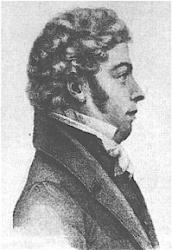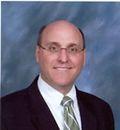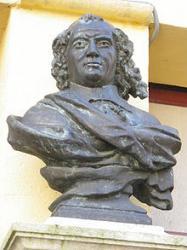Planning worship?
Check out our sister site, ZeteoSearch.org,
for 20+ additional resources related to your search.
- |
User Links
Person Results
Johan Olof Wallin

1779 - 1839 Scripture: Matthew 2:6 Author of "Jerusalem, Lift Up Thy Voice!" in The Hymnal and Order of Service Johan Olaf Wallin was born at Stora Tuna, in 1779, and early displayed his poetical powers. In 1805, and again in 1809, he gained the chief prize for poetry at Upsala. In the latter year he became pastor at Solna; here his ability as a preacher was so striking that he was transferred to Stockholm, in 1815, as "pastor primarius," a title for which we have no exact equivalent. In 1818 he was made Dean of Westeras, and set about the task of editing a revised hymn-book for the whole of Sweden. This task he completed in 1819, and published it as, Den Swenska Psalmboken, af Konungen gillad och stadfästad (The Swedish hymn-book, approved and confirmed by the King). To it he contributed some 150 hymns of his own, besides translations and recastings; and the book remains now in the form in which he brought it out. It is highly prized by the Swedes, and is in use everywhere.
--John Julian, Dictionary of Hymnology, p. 1000 (1907)
Johan Olof Wallin
S. J. Hedborn

1783 - 1849 Person Name: Samuel Johan Hedborn Scripture: Matthew 2:1-12 Author of "Now Israel's Hope in Triumph Ends" in The Hymnal and Order of Service Samuel Johan Hedborn, born 14 October 1783 in Kolstad, Heda parish in Östergötland, died 26 December 1849 in Assjö rectory in Askeryds parish, Jönköping in Småland, was a Swedish writer, wise and hymn writer.
Hedborn was born in a soldier in the village Kolstad out on Östgötaslätten and had all his youth and first study in Linköping and then at Uppsala University 1806 - in 1809 a struggle against poverty, was ordained last year. After his ordination, he was first a curate in Östergötland same year, teachers in Stockholm in 1812 and extraordinary court preacher in 1815. In Uppsala and Stockholm , he became good friends with many Swedish romantic, including Atterbom, which also had its roots in Östergötland and northern Småland. Hedborn became one of the Aurora League's founders and helped in Phosphoros and Poetic calendar, where he published a number of poems, some of which Lullaby (Ute summer breeze blowing) is probably his best known. 1810-14 Hedborn suffered from depression, which at times made him unable to attend to his duties. During this time he developed into religious poet and published two collections of Psalms (1812-13). After a long silence gathered Hedborn his poems in memory and poetry, beginning of an autobiography, which is mostly about his childhood.
Samuel Johan Hedborns collected writings were published with biography of Per Daniel Amadeus Atterbom in two bands in 1853.
He was vicar in his mother's home parish Askeryd in Linköping diocese from 1820 until his death, where Hedborn also is buried at Askeryds church during a cast iron cross. Hedborn is represented in the 1986 hymnal with original texts of five works (No 120, 132, 329, 347 and 391) and processing/translation of a hymn (No. 104).
He is buried in Askeryds cemetery east of Aneby.
--sv.wikipedia.org/wiki
S. J. Hedborn
Conrad Emil Lindberg
Scripture: Matthew 2:1-12 Translator of "Now Israel's Hope in Triumph Ends" in The Hymnal and Order of Service
Conrad Emil Lindberg
Basil Harwood

1859 - 1949 Person Name: Basil Harwood, 1859-1949 Scripture: Matthew 2 Harmonizer of "DEUS TUORUM MILITUM" in Common Praise (1998) Basil Harwood (11 April 1859 – 3 April 1949) was an English organist and composer.
Basil Harwood was born in Woodhouse, Gloucestershire (the second youngest of 12 children) on 11 April 1859. His mother died in 1867 when Basil was eight. His parents were Quakers but his elder sister Ada, on reaching 21 in 1867, converted to the Anglican Church. Basil was allowed to attend the ceremony at the Church of England in Almondsbury and this is where he was first drawn to organ music and choral singing. His father, Edward, remarried two years later in 1869 to a lady from an Anglican family. Basil was now sent to the Montpellier School in Weston-super-Mare for a year. In 1871, at 12 he was enrolled in Clevedon, the preparatory school for Charterhouse where he was first to formally study music.
He went up to Charterhouse in 1874 and left in 1876 having won a leaving Exhibition to Trinity College, Oxford where he initially studied Classics (1879) and Modern History (1880). He then studied for a further two years, 1881–1882, at the Leipzig Conservatory under Carl Reinecke and Salomon Jadassohn. It was here in 1882, Basil composed his first anthem for chorus and organ "O Saving Grace." He returned from Leipzig to realise that he had now passed the age limit to study music formally.
In 1883, Basil became organist of St. Barnabas Church, Pimlico completing his Sonata in C# Minor here in 1885, selling the copyright to the publisher Schott for one shilling a year or two later. After this success, he then moved to Ely Cathedral in 1887 where he wrote the bulk of Dithyramb, possibly his greatest organ work. His final appointment was as organist at Christ Church, Oxford and as precentor of Keble College, Oxford from 1892 to 1909. Whilst there he co-founded and conducted the Oxford Bach Choir which helped to earn him his degree as Doctor of Music. He conducted the Oxford Orchestral Association (1892–1898).
He was musical editor of the 1908 Oxford Hymn Book and Examiner for Musical Degrees (1900–1925).
During this time, he met and married Mabel Ada Jennings (the daughter of George Jennings) (who had become a pupil of his in 1896) at All Souls St. Marylebone, London (27 December 1899). Mabel had studied music herself, piano and composition, and was also a writer. She may well have composed lyrics for some of his lesser known tunes. At an advanced age she wrote a small volume of collected poems named Questing Soul.
He retired early at 50 (in 1909) after the death of his father, Edward Harwood, from whom he inherited the family estate of Woodhouse having outlived his seven older brothers. Soon after moving in he had a three manual chamber organ built in the library by Bishop & Sons of Ipswich (now in Minehead Parish Church), on which he promptly finished his Sonata in F# Minor. He continued to compose prolifically.
He was a keen walker, and named many of his hymn tunes after local places that he loved to visit, the most notable being the hymn tunes such as Tockington, Olveston, Almondsbury and Thornbury.
In 1936 advancing in years, he let the Woodhouse estate and moved to Bournemouth. Part of the estate, Woodhouse Down, was later sold to his contemporary Robert Baden-Powell who was two years older than he was and who had also attended Charterhouse School, and is used as a Scout Camp to this day.
In 1939, at eighty, he moved to London, taking a flat in Fleet Street. After a long life, he died on 3 April 1949, eight days short of his 90th birthday, at Courtfield Gardens in the Royal Borough of Kensington, London. A memorial service was held in St Paul's Cathedral on 22 April 1949. Mabel survived him, dying shortly before her 103rd birthday on 20 July 1974. He was survived by two sons; Major John Edward Godfrey Harwood (1900–1996) and Basil Antony Harwood (1903–1990) Senior Master of the Supreme Court, Q.B.D. and Queen's Remembrancer.
His remains are interred in St. Barnabas Church, Pimlico and marked by a plaque inset in floor of the chancel, close to where he would have stood to conduct the choir.
He composed cantatas, church music and works for the organ; his Service in A flat, the anthem O how Glorious and the hymn tunes LUCKINGTON ("Let all the world in every corner sing") and THORNBURY ("Thy hand O God has guided"), first used during a festival of the London Church Choir Association, remain in the Anglican repertory.
--en.wikipedia.org/wiki
Basil Harwood
Eric T. Myers

Scripture: Matthew 1:18-25, 2:1-12 Arranger of "BRING A TORCH" in Glory to God Eric T. Myers--
Eric serves as Pastor of Frederick Presbyterian Church in Frederick, Maryland. Before ordination, he served as Director of Music and Organist at churches in South Carolina and Virginia. He holds degrees from Shenandoah College and Conservatory of Music, Columbia Theological Seminary, University of Notre Dame, and a PhD from Garrett-Evangelical Theological Seminary; he has served as adjunct faculty at Garrett-Evangelical Seminary and Wesley Theological Seminary in Washington, DC.
--www.presbyterianhymnal.org/
Eric T. Myers
Nicholas Saboly

1614 - 1675 Person Name: Nicolas Saboly Scripture: Matthew 1:18-25, 2:1-12 Composer (attributed) of "UN FLAMBEAU (BRING A TORCH)" in Voices Together Nicholas Saboly was born on January 30, 1614 in Monteux, France.His father died when he was 5 and at that time he was sent to the Jesuit school at Carpentras, which had been the seat of Pope Clement V for one year in 1313. After finishing his studies at Carpentras, Saboly studied theology at the University of Avignon.
In 1633, Saboly became chaplain in the cathedral Saint-Siffrein de Carpentras. He never completed hist studies at Avignon. Nevertheless, he was ordained sub-deacon, deacon, and priest in the Roman Catholic church.
In 1639, Saboly was given the post of organist and chapel master at the Carpentras cathedral.He later returned to Avignon where he was given the post of organist at Saint-Pierre d'Avignon.
Saboly is best remembered for his composition of Mass settings and Christmas carols. He died on July 25, 1675, in Marseille, France.
(Source: Wikipedia France)
Nicholas Saboly
Carol M. Bechtel
b. 1959 Person Name: Carol Bechtel Scripture: Matthew 1, 2 Author (st. 5) of "What Adam's Disobedience Cost" in Lift Up Your Hearts Carol Bechtel has served as professor of Old Testament at Western Theological Seminary in Holland, Michigan, since 1994. She is a graduate of Hope College and Western Theological Seminary, and she received her Ph.D. in Old Testament from Yale University. Bechtel preaches and teaches widely and is the author of several books, including Esther: A Commentary for Teaching and Preaching (Interpretation, WJK, 2002). She is a General Synod Professor of Theology in the Reformed Church in America and has served as president of the RCA’s General Synod (1998/1999) and as moderator of its General Synod Council (1999/2000). She lives in Holland, Michigan, with her husband, Tom Mullens, where they enjoy a growing group of children and grandchildren. Her interests include singing, cooking, gardening, and the Celtic harp. She served on the editorial committee for Psalms for All Seasons (2012) and for Lift Up Your Hearts (2013).
Emily Brink
Carol M. Bechtel
Emily R. Brink

b. 1940 Person Name: Emily R. Brink, b. 1940 Scripture: Matthew 1, 2 Harmonizer of "DETROIT" in Lift Up Your Hearts Emily R. Brink is a Senior Research Fellow of the Calvin Institute of Christian Worship and Adjunct Professor of Church Music and Worship at Calvin Theological Seminary, Grand Rapids, Michigan. Her main areas of responsibility are conference planning and global resources. She is program manager of the annual Calvin Symposium on Worship, which draws more than 70 presenters and 1600 participants from around the world. She also travels widely to lecture and to learn about worship in different parts of the world, especially in Asia, where she has lectured in Bangladesh, China, Hong Kong, India, Indonesia, Japan, Nepal, Pakistan, Philippines, Singapore, and Taiwan.
Her areas of interest include congregational song from all times and places; psalmody; hymnal editing. She was editor of four hymnals and consults with a wide range of churches on worship renewal issues. Dr. Brink is active in the American Guild of Organists, serving in both local and national offices, as well as in the Hymn Society in the United States and Canada (president from 1990 1992) and named a Fellow of the Hymn Society in 2004 in recognition of distinguished services to hymnody and hymnology.
--internal.calvinseminary.edu/
Emily R. Brink
Charlotte B. Merritt
Person Name: Mrs. Charlotte B. Merritt Scripture: Matthew 2:1 Author of "Christ is King" in The Bright Array
Charlotte B. Merritt
Adam Drese
1620 - 1701 Person Name: Adam Drese, 1620-1701 Scripture: Matthew 2:6 Author of "Jesus, Call Thou Me" in Moravian Book of Worship Drese, Adam, was born in Dec. 1620, in Thuringia, probably at Weimar. He was at first musician at the court of Duke Wilhelm, of Sachse-Weimar; and after being sent by the Duke for further training under Marco Sacchi at Warsaw, was appointed his Kapellmeister in 1655. On the Duke's death in 1662, his son, Duke/Bernhard, took Drese with him to Jena, appointed him his secretary, and, in 1672, Town Mayor. After Duke Bernhard's death, in 1678, Drese remained in Jena till 1683, when he was appointed Kapellmeister at Arnstadt to Prince Anton Günther, of Schwarzburg-Sondershausen. He died at Arnstadt, Feb. 15, 1701 (Koch, iv. 270-274; Allg. Deutsche Biog., v. 397; Wetzel, i. 1934, and A. H. , vol. i., pt. iv., pp. 28-30).
In 1680, the reading of Spener's writings and of Luther on the Romans led to a change in his religious views, and henceforth under good and evil report he held prayer meetings in his house, which became a meeting-place for the Pietists of the district. "His hymns," says Wetzel, "of which he himself composed not only the melodies, but also, as I have certain information, the text also, were Bung at the meetings of pious persons in his house, before they came into print."
One has been translated into English, viz.:—
Seelenbräutigam, Jesus, Gottes Lamm, appeared in the Geistreiches Gesang-Buch, Halle, 1697, p. 147, in 15 stanzas of 6 1., repeated (with the well-known melody by himself added, which in the Irish Church Hymnal is called "Thuringia"), in the Darmstadt Gesang-Buch, 1698, p. 134, as No. 197 in Freylinghausen's Gesang-Buch, 1704, and recently as No. 119 in the Berlin G. L.S. , ed. 1863. In Wagner's Gesang-Buch, Leipzig, 1697, vol. iii. p. 420, it begins, "Jesu, Gottes Lamm." The translation in common use is:—
Bridegroom, Thou art mine, a translation of stanzas 1, 2, 4, 8, 13-15, by Dr. M. Loy, as No. 283 in the Ohio Lutheran Hymnal, 1880.
Another translation is, "God and man indeed," of stanza iii. as stanza i. of No. 463 in the Moravian Hymnbook, 1189 (1886, No. 224). [Rev. James Mearns, M.A.]
-- John Julian, Dictionary of Hymnology (1907)
Adam Drese


 My Starred Hymns
My Starred Hymns


